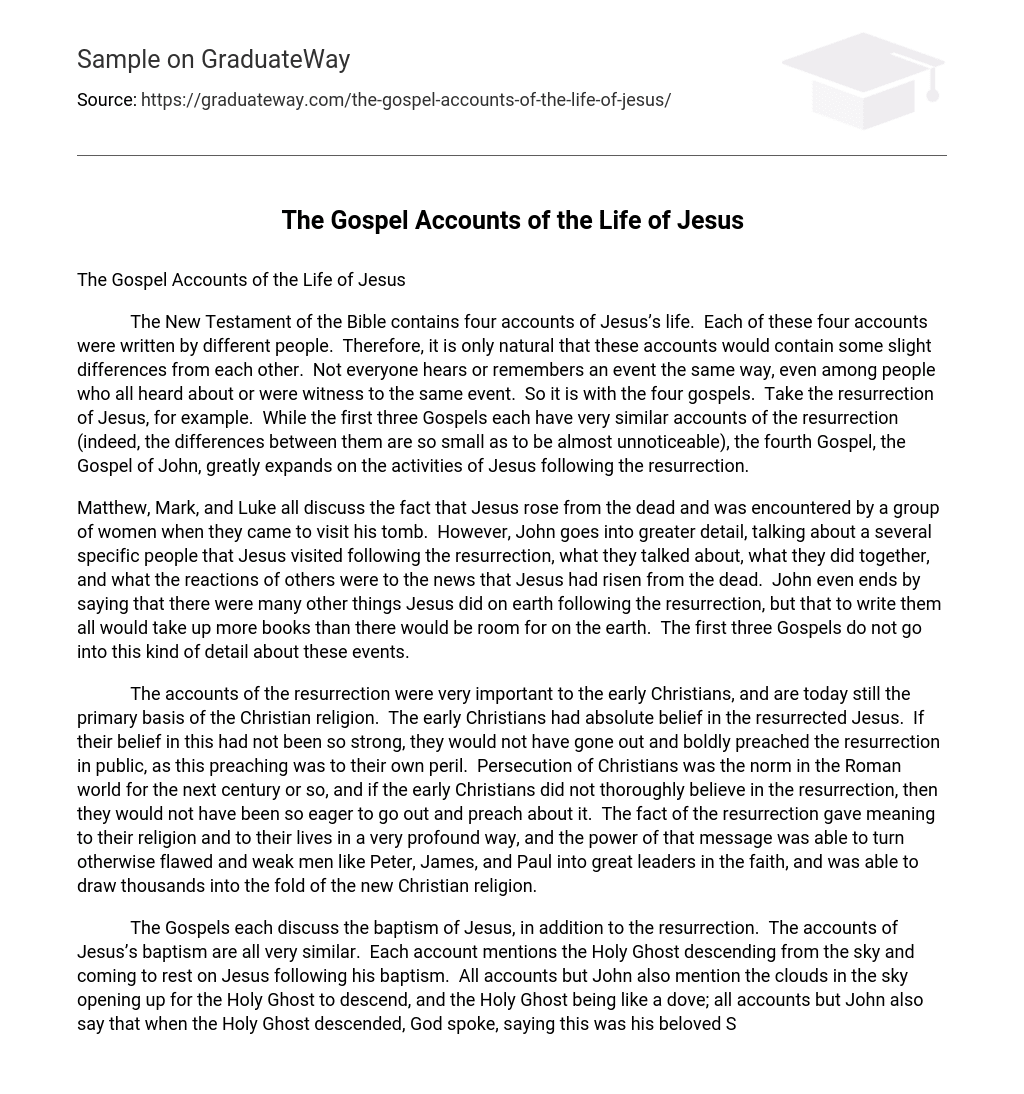The New Testament of the Bible contains four accounts of Jesus’s life. Each of these four accounts were written by different people. Therefore, it is only natural that these accounts would contain some slight differences from each other. Not everyone hears or remembers an event the same way, even among people who all heard about or were witness to the same event. So it is with the four gospels. Take the resurrection of Jesus, for example. While the first three Gospels each have very similar accounts of the resurrection (indeed, the differences between them are so small as to be almost unnoticeable), the fourth Gospel, the Gospel of John, greatly expands on the activities of Jesus following the resurrection.
Matthew, Mark, and Luke all discuss the fact that Jesus rose from the dead and was encountered by a group of women when they came to visit his tomb. However, John goes into greater detail, talking about a several specific people that Jesus visited following the resurrection, what they talked about, what they did together, and what the reactions of others were to the news that Jesus had risen from the dead. John even ends by saying that there were many other things Jesus did on earth following the resurrection, but that to write them all would take up more books than there would be room for on the earth. The first three Gospels do not go into this kind of detail about these events.
The accounts of the resurrection were very important to the early Christians, and are today still the primary basis of the Christian religion. The early Christians had absolute belief in the resurrected Jesus. If their belief in this had not been so strong, they would not have gone out and boldly preached the resurrection in public, as this preaching was to their own peril. Persecution of Christians was the norm in the Roman world for the next century or so, and if the early Christians did not thoroughly believe in the resurrection, then they would not have been so eager to go out and preach about it. The fact of the resurrection gave meaning to their religion and to their lives in a very profound way, and the power of that message was able to turn otherwise flawed and weak men like Peter, James, and Paul into great leaders in the faith, and was able to draw thousands into the fold of the new Christian religion.
The Gospels each discuss the baptism of Jesus, in addition to the resurrection. The accounts of Jesus’s baptism are all very similar. Each account mentions the Holy Ghost descending from the sky and coming to rest on Jesus following his baptism. All accounts but John also mention the clouds in the sky opening up for the Holy Ghost to descend, and the Holy Ghost being like a dove; all accounts but John also say that when the Holy Ghost descended, God spoke, saying this was his beloved Son, in whom He was well pleased. Jesus’s birth is discussed in only two of the Gospels, Matthew and Luke. Matthew’s account is the typical Christmas story that we all hear, with Mary giving birth in the manger and the three wise men coming bearing gifts. Luke goes into a little more detail, discussing events leading up to Jesus’s birth, including the conception of John the Baptist, and Mary’s visit with her cousin Elizabeth (John’s mother) after finding out she was to bear the child of God. It is unclear why Mark and John do not discuss the birth of Jesus in their Gospels; perhaps they did not find it to be as important as Jesus’s baptism, but we do not know for sure. However, the account of the birth of Jesus, with all of its prophetic signs and miraculous occurrences, is just as much of a testament to God’s great power and love and overall plan for Jesus on earth as are the other parts of the story. The birth should certainly not be ignored in a study of Jesus’s life.
The Apostle Paul, while he did not know Jesus personally, nonetheless became the most influential person in the early Christian religion after a conversion experience on the road to Damascus. It is because of Paul that the early Christian church gained so many converts so quickly, and he was the author of much of the early Christian doctrine. Paul was and is a controversial figure, particularly in regards to his teachings. This is why there is an Orthodox Christian church that follows the teachings of Peter, while all other Christian churches follow the teachings of Paul. Paul taught that salvation was to be had by belief in Christ and His resurrection alone, and that the old Jewish Mosaic laws were obsolete since the resurrection; this was highly controversial for the time, and caused a major rift between Paul and Peter. Paul was also a big advocate of bringing Gentiles into the Christian church, and not requiring them to follow Mosaic law or be circumcised (another reason for the Peter/Paul rift). Paul also taught that the dead who believe in Christ Jesus shall rise again one day, on the day of judgment. While this is essentially what the four Gospels also teach, it is very different from the traditional Jewish concept of Sheol, a place where only a shadow of a person’s former self remains after death, and where the dead are abandoned forever; there is no concept of being near God after death, while in Paul’s and Christianity’s teachings, the dead are eventually reunited with God and Christ in heaven, to be with them always.
Bibliography
The Holy Bible (King James version). (1958) Philadelphia, PA: National Bible Press.





